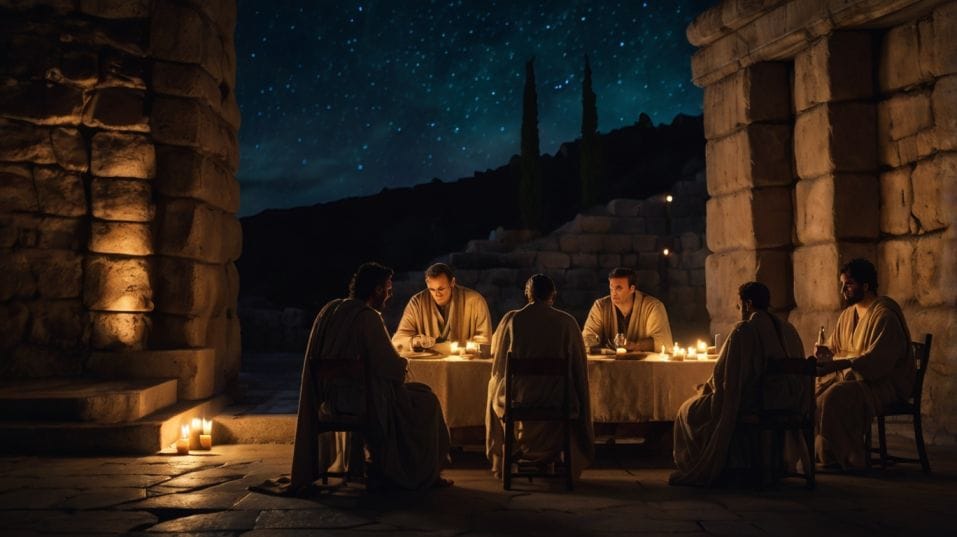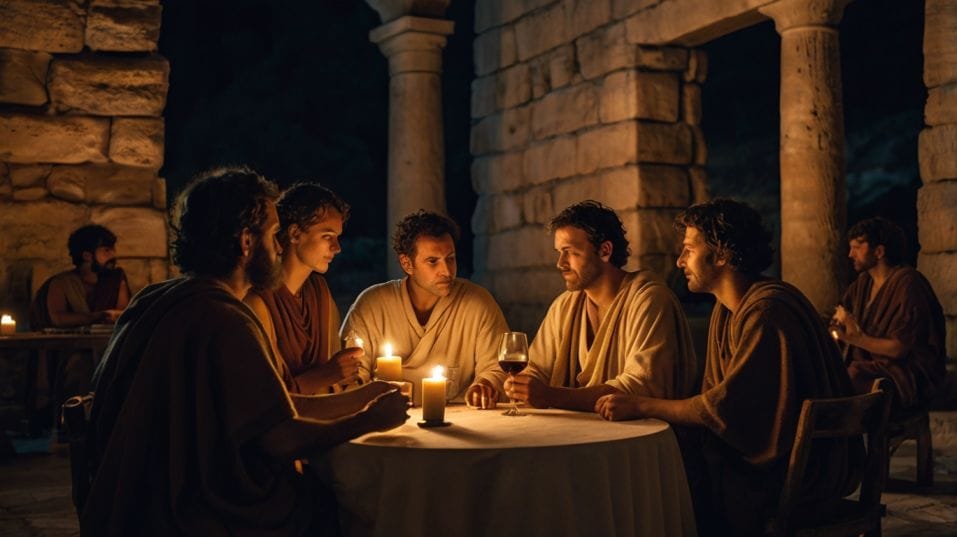The Role of Wine in Ancient Greece
Discover how the Greeks approached wine with purpose—and how their rituals, tools, and mindset can reshape how you taste today.

What if wine wasn’t just something you sip—but a way to sharpen how you think, feel, and connect? In ancient Greece, wine shaped daily life, belief systems, and intellectual exchange.
For those early in their wine journey, the Greek mindset offers something more lasting than trends: a sense of purpose.
Their practices—intentional, thoughtful, grounded—can help you taste with more clarity and drink with more meaning. Here's how their legacy can elevate your own glass.
Wine Was Culture, Not Just Consumption
To the ancient Greeks, wine wasn’t something you drank casually without thought—it was something you engaged with.
It was part of the daily table and the sacred ceremony. Used in offerings to gods, toasted at weddings, poured in rituals of mourning and celebration alike. It had gravity. But it also had joy.
It’s easy to overlook wine’s place in your life when you treat it as just another beverage. But wine reveals more—when you let it. The Greeks mixed it with water to extend the drinking experience, not to weaken it.
They understood that wine, like conversation or art, unfolds in stages. A bottle, like a thought, develops as it breathes. You can taste that. You should.

The Symposium: A Masterclass in Mindful Drinking
No piece of Greek culture better expresses their philosophy of wine than the symposium.
These intimate, often philosophical gatherings were more than social events—they were experiences built around wine’s ability to open people up, to slow things down, to make ideas and connections more vivid.
At a symposium, nothing was rushed. Wine was mixed and served by the symposiarch, who set the ratio of water to wine and the pace of drinking. The point wasn’t excess—it was depth.
Poets recited verses. Musicians played the lyre. Arguments were welcomed. Humor, too. Wine fueled the exchange, not the escape.
This kind of intentionality still matters. If you rush through wine, you miss it. Instead, let it structure your moment. Pour a bottle when you’re ready to focus.
Use it as a backdrop for real conversation, or a lens through which to observe how flavors evolve. Wine is best when you’re present.
Terroir Without the Term: How the Greeks Knew Their Vines
The Greeks didn’t coin “terroir,” but they practiced it. They knew that where a vine grew changed the wine it produced. They tracked microclimates, soils, and slopes across the Aegean.
Lesbos produced a famously rich red; Thasos, wines praised for their intensity. The volcanic soil of Santorini—still active today—gave wines a fierce minerality.
What’s powerful here isn’t just historical curiosity. It’s a reminder that wine is grounded in place. Taste always has a source.
When you learn to read a label or ask questions about origin, you're not being pretentious—you’re connecting dots between land, climate, and character. The Greeks tasted with that awareness. You can too.
Vessels, Tools, and the Art of Pouring
Greek wine was stored in amphorae, cooled in psykters, diluted in kraters, and sipped from kylixes. Every vessel had a purpose.
A kylix’s wide mouth wasn’t decorative—it helped release aroma and moderate pace. The krater brought balance and structure to the whole experience.
Today, your glassware plays the same role. Choose the right shape for the wine—tulip for aromatic whites, broader bowls for complex reds.
Use a decanter to soften tannins and wake up older bottles. Don’t over-chill. Don’t overfill. Temperature, air, and glass shape aren’t technicalities—they’re tools for seeing the wine more clearly.
The Greek mindset was practical. They didn’t fetishize the gear. But they knew it mattered. The right vessel, like the right setting, makes wine speak.
Wine and the Divine: Meaning Beyond Flavor
Dionysus, the Greek god of wine, wasn't just a patron of indulgence—he was also linked to theater, rebirth, and transformation.
His presence in rituals acknowledged that wine could blur boundaries: between human and divine, joy and chaos, order and inspiration.
Even today, wine has this strange, alchemical power. It transforms dinner into a ritual. A simple night into a memory. That transformation is real—and knowing how to harness it makes you a better drinker.
Approach wine with intention. You don’t need mythology to make the moment meaningful. But you do need attention. If you treat wine like something sacred, even once in a while, it gives back in kind.
Daily Drinking and Lifelong Learning
Despite its place in temples and symposiums, wine in Greece was also profoundly everyday.
It was made in households, poured at lunch, sipped in the shade after work. Farmers drank it from clay mugs. Philosophers drank it while drafting ideas that still shape the world.
What that shows you is this: expertise doesn’t have to be distant. You don’t need a cellar full of rare vintages to drink like the Greeks did. You need openness. Curiosity. A willingness to taste slowly, to observe, to ask.
Whether you’re swirling a $20 bottle from Macedonia or a Greek-inspired blend from California, what matters is your attention—not the price.
Final Thoughts: Add Purpose to Your Pour
The Greeks didn’t separate drinking from thinking. They believed wine was a way to engage with the world—not to escape it.
You don’t need to recreate ancient rituals, but you can learn from their approach. Slow down. Ask more of your wine. Ask more of yourself.
Start by picking a Greek wine this week—a Xinomavro, Assyrtiko, or Agiorgitiko. Taste it with friends. Notice how it changes in the glass.
Or create your own version of a symposium: one bottle, a few voices, and a willingness to pay attention.
When you treat wine with meaning, it gives you more than flavor. It gives you perspective. Try that—and see what opens up.




